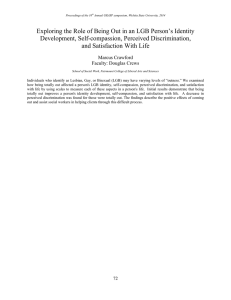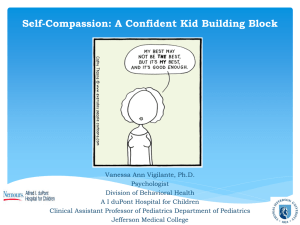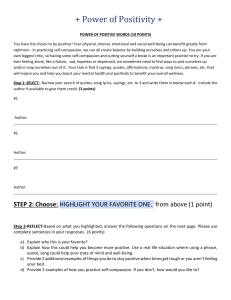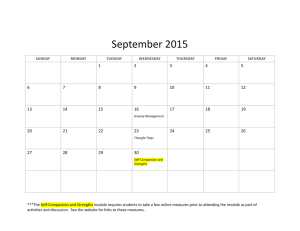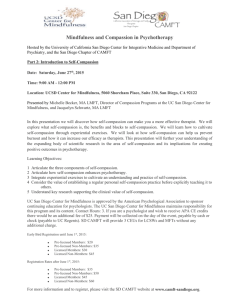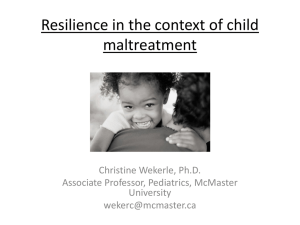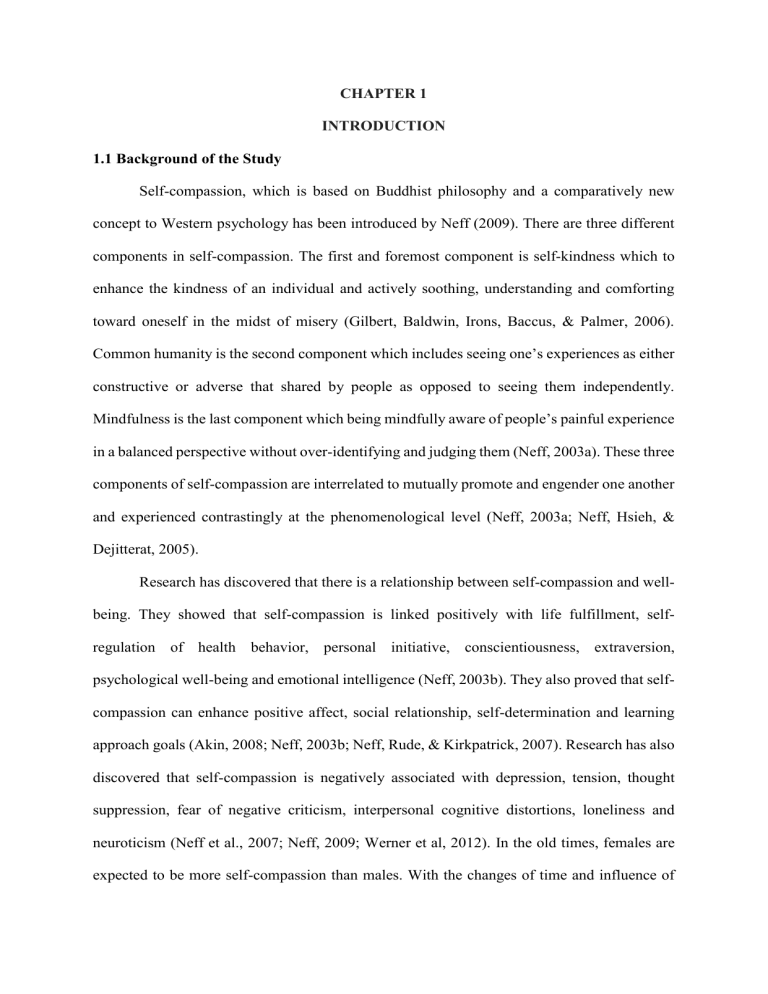
CHAPTER 1 INTRODUCTION 1.1 Background of the Study Self-compassion, which is based on Buddhist philosophy and a comparatively new concept to Western psychology has been introduced by Neff (2009). There are three different components in self-compassion. The first and foremost component is self-kindness which to enhance the kindness of an individual and actively soothing, understanding and comforting toward oneself in the midst of misery (Gilbert, Baldwin, Irons, Baccus, & Palmer, 2006). Common humanity is the second component which includes seeing one’s experiences as either constructive or adverse that shared by people as opposed to seeing them independently. Mindfulness is the last component which being mindfully aware of people’s painful experience in a balanced perspective without over-identifying and judging them (Neff, 2003a). These three components of self-compassion are interrelated to mutually promote and engender one another and experienced contrastingly at the phenomenological level (Neff, 2003a; Neff, Hsieh, & Dejitterat, 2005). Research has discovered that there is a relationship between self-compassion and wellbeing. They showed that self-compassion is linked positively with life fulfillment, selfregulation of health behavior, personal initiative, conscientiousness, extraversion, psychological well-being and emotional intelligence (Neff, 2003b). They also proved that selfcompassion can enhance positive affect, social relationship, self-determination and learning approach goals (Akin, 2008; Neff, 2003b; Neff, Rude, & Kirkpatrick, 2007). Research has also discovered that self-compassion is negatively associated with depression, tension, thought suppression, fear of negative criticism, interpersonal cognitive distortions, loneliness and neuroticism (Neff et al., 2007; Neff, 2009; Werner et al, 2012). In the old times, females are expected to be more self-compassion than males. With the changes of time and influence of other culture, females are reported tend to be less self-compassion than males (Neff & Vonk, 2009; Raes, 2010). Self-regulation of health behavior play a very significant role for society and it does include setting goals, taking action, attention to and evaluation of ongoing behavior, and treatment adherence. In the old times, females tend to engage in self-regulation which involve planning goals, taking action and monitoring their own progress toward health goal (Baumeister & Heatherton, 1996). With the changes of time and influence of other culture, research has additionally discovered that that women are more likely to engage in health-related information compared to men (Courtenay, 2000; Wellstead, 2011). Research on self-compassion has found that it may enhance the successful selfregulation of health-related behaviors by reducing defensiveness, lowering the emotional states and self-accuse that interfere with self-regulation, and increasing compliance with medical recommendations (Meredith, Terry, & Leary, 2011; Terry & Leary, 2011). People who high in self-compassion are adapt better with distressing events and less exhausted by illness and injury. Therefore, they have higher self-regulatory resources to devote to self-care (Terry & Leary, 2011). People high in self-compassion would have more effectively to sort out health goals, engage in behavior to achieve their goals, screen their goal progress and alter their behavior or goals when adequate and sufficient progress is not being made (Meredith, Terry, & Leary, 2011). 1.2 Statement of Problem University is a place where undergraduates complete their tertiary education and research in various academic fields. When enrolled to university, it brings satisfaction to them as well as to improve their knowledge, social expertise, physical and psychological well-being (Elias, Mahyuddin & Uli, 2009). However, undergraduates encounter difficulty during their chance in university. According to Smith and Renk (2007), undergraduates confront different overpowering difficulties in the university. For instance, examinations and assignments, expectations from tutor and parents, choosing a major, plan in future and financial issue. One of the major obstacles faced by local undergraduates is health problems where they are less caring about their health or lack of ability to take care of themselves when they are just focused on their studies (Ahmad, Fauziah, Azemi, Shaari & Zailani, 2002). Failures of selfregulation are typical and across the board issue and it can lead to serious consequences to health-related behaviors. A various type of reasonable factor may confine an individual’s capacity to self-regulate effectively regarding health-promoting behaviors such as knowledge, lacking time and access to well-being advancing resources (Meredith, Terry, & Leary, 2011). However, even with enough time, learning and resources, individual may still feel challenge regulating their health-related behavior due to having lower social support. Besides, many health problems emerge specifically from local undergraduate’s behavior decision (Meredith, Terry, & Leary, 2011). In this manner, there are still at least partially controllable. However, local undergraduates regularly do not behave in ways that could enhance their health and expand their lives. For instance, adhering to a good diet and exercise regularly are connected to reduce the risk of heart disease, diabetes, and obesity. But, there is numerous individuals neglect to eat, practice and exercise in ways that would bring down their hazard for these issues. Failures of self-regulation are a general and boundless issue (Meredith, Terry, & Leary, 2011). Furthermore, failure to manage health-related behavior can have a significant impact and consequences to local undergraduates (Neff, 2003a). As a result, they might face difficulty and have a tendency to experience negative emotions such as depression, anxiety, and stress in university’s life (Neff, 2003a). Research has also discovered that males are always unwilling and lack of the motivation to engage with health-related behavior compared to females both in daily life and stressful life events (Wellstead, 2011; Mansfield, Addis, & Mahalik, 2003). Local undergraduates play a very significant role in the society. Therefore, certain personal strength must be provided to people to assist them better deal with all those negative, challenging and stressful events. This study suggests self-compassion as a way that can assist local undergraduates to accomplish psychological well-being. Past studies also found that selfcompassion can promote happiness, optimism, sense of relatedness and taking initiative to practice self-regulation of health behavior (Leary et al., 2007; Terry & Leary, 2011). Although all these findings are showing potential, explore on self-compassion is still in its early stage. The relationship between self-compassion and other significant well-being needs to be examined further (Kristin, Hsieh, & Dejitterat, 2005). Therefore, the purpose of this study is to study the relationship between self-compassion and self-regulation of health behavior among students at a selected private university in Kuala Lumpur. 1.3 Research Objectives/ Purpose of study The objectives in this study are: 1. To study the relationship between self-compassion and self-regulation of health behavior among university students. 2. To study gender difference on self-compassion among university students. 3. To study gender difference on self-regulation of health behavior among university students. 1.4 Research Questions/ Hypotheses 1. There is a relationship between self-compassion and self-regulation of health behavior among university students. 2. There is a gender differences between male and female on self-compassion among university students. 3. There is gender differences between male and female on self-regulation of health behavior among university students. 1.5 Significance of Study Overall, the findings of this study will contribute to the benefit of society considering that self-compassion plays a significant role in social connectedness. It assists to promote the learning process by liberating individuals from the destructive outcome of harsh self-feedback, detachment, over-recognizable in the face of failure. It also furnishes undergraduates with selfgraciousness, a sense of common humanity and emotional balance. Therefore, it provides an approach for people to encounter positive feelings towards themselves and increase the sentiments of interconnectedness. Besides, the findings of this study will also contribute to the benefit of society considering that self-compassion acts a vital part self-regulation of behavior. It helps people to set realistic goals which are more in wellbeing oriented goal. With self-compassion, a person will increase their sense of belonging which receives support from others, therefore they will be more engaging in self-regulation of health behavior. Self-compassion might be an effective and powerful wellspring of thoughts for future research on the psychology of health and wellbeing. Studying the role of self-compassion in how an individual administer health-related behaviors can provide important and valuable information about the procedure by which selfcompassion may assist an individual to act in ways that enhance their health and well-being. Therefore, efforts are right now in progress to build up a self-compassion intervention for undergraduates. Paul Gilbert (2010) has introduced a common therapeutic approach which is Compassion-Focused Therapy (CFT). It is to assist people to develop the skills of a selfcompassionate mind. This therapy can enhance awareness and comprehend of automatic emotional reactions such as self-criticism. It also involves motivating people to concern for their well-being, to become more sensitive to their own needs, goals, and distress. 1.6 Definition of Variables 1.6.1 Self-compassion 1.6.1.1 Conceptual Definition: Neff (2003a) defined self-compassion as being available to and touched by one’s own misery, going through feelings of concern and benevolence toward oneself, practicing non-judgmental attitude and understanding towards one’s insufficient and imperfections and perceiving it as part of the mutual human experience for one’s experience. 1.6.1.2 Operational Definition: Respondent’s scores on the Student’s Self-compassion Scale (Neff, 2003a) which used a 5-point scale, ranging from 1 = “almost never” to 5 = “almost always”. Higher scores indicate higher level of self-comparison. 1.6.2 Self-regulation of health behavior 1.6.2.1 Conceptual Definition: Gochman (1997) defined health behavior as the personality, habits, and action of an individual in managing his or her health issues. Besides, Bauemeister and Heatherton (1996) defined self-regulation as setting goals, taking initiative, monitoring progress toward health behavior, regulating emotion and modifying behavior if away from goal. 1.6.2.2 Operational Definition: Respondent scores on the subscale of health responsibility in Health-promoting Lifestyle Profile II (Walker & Hill-Polerecky, 1996) for students which use a 4-point Likert scare, ranging from 1 = “never” to 4 = “routinely”. Higher scores indicate better self-awareness in health responsibility.
